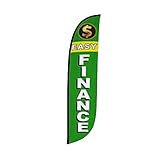In House Finance Cars
As an Amazon Services LLC Associates Program participant, we earn advertising fees by linking to Amazon, at no extra cost to you.
Factors Impacting Approval for In House Financing
Credit Score: One of the key factors that impacts approval for in-house financing is your credit score. A higher credit score typically results in a better chance of approval as it demonstrates your ability to manage debt responsibly.
Income Stability: Lenders offering in-house financing will also consider your income stability. A steady income stream can boost your approval chances as it indicates your ability to make regular payments.
Debt-to-Income Ratio: Your debt-to-income ratio is another crucial factor that lenders assess. A lower ratio suggests that you have a manageable level of debt compared to your income, making you a more attractive candidate for financing.
Down Payment: Providing a larger down payment can also increase your chances of approval for in-house financing. A substantial down payment reduces the lender’s risk and demonstrates your commitment to the purchase.
Collateral: If you are applying for in-house financing for a big-ticket item like a car or a house, having collateral to secure the loan can improve your approval odds. Collateral provides the lender with reassurance in case you default on the loan.
Top Considerations Before Choosing In-House Finance
Evaluate Your Financial Situation: Before opting for in-house finance, it’s crucial to assess your current financial standing. Consider your income, expenses, debts, and savings to determine if in-house financing is the right choice for you.
Understand the Terms and Conditions: Take the time to read and comprehend the terms and conditions of the in-house financing agreement. Pay attention to interest rates, repayment schedules, and any additional fees that may apply.
Compare with External Financing Options: Don’t settle for in-house finance without exploring external financing options. Compare interest rates, terms, and benefits offered by banks, credit unions, or online lenders to make an informed decision.
Assess the Risks Involved: In-house financing may come with certain risks, such as higher interest rates or stricter repayment terms. Evaluate these risks and consider if you are comfortable taking them on.
Consider the Long-Term Implications: Think about how in-house financing will impact your financial future. Will it help you achieve your long-term goals or hinder your progress? Make sure to weigh the pros and cons carefully.
Maximizing Benefits of In House Car Financing
In-house car financing can be a valuable option for those looking to purchase a vehicle without the hassle of dealing with third-party lenders. With direct financing from the dealership, you can maximize benefits such as convenience, flexibility, and potentially better loan terms.
One of the key advantages of in-house car financing is the convenience it offers. You can complete the entire financing process in one place, saving time and effort. Additionally, dealerships may be more willing to work with individuals who have less-than-perfect credit scores.
Another benefit of in-house financing is the flexibility it provides. Dealerships may offer customizable loan terms to fit your budget and financial situation. This can be especially helpful for those who may not qualify for traditional bank loans.
Lastly, in-house car financing could potentially lead to better loan terms. Dealerships often have special promotions or incentives for financing through them, such as lower interest rates or reduced down payments.
Overall, maximizing the benefits of in-house car financing can save you time, offer flexibility, and potentially provide better loan terms than traditional financing options.
Can I Get In-House Financing on Used Cars? Tiny car with coins and finance paperwork. Are you on the hunt for used car lots with in-house financing …
In-House Financing for Used Cars | Hendrick Chevrolet Hoover
We Finance · In-House Financing – No Banks · Approvals as fast as 5-mins · Credit score is not important · Applying won't hurt your score · No driver's license …
Auto City Credit – Dallas Buy Here Pay Here Used Car Dealers
Are you searching for used car lots with in-house financing? Start your search with the trusted team at Marietta Toyota.
In-House Financing for Used Cars in Marietta | Marietta Toyota
Are you looking for used car dealerships near Mount Vernon offering in-house financing for used cars? Victory Mitsubishi makes buying used easy with our …
In-House Financing for Used Cars in Bronx | Victory Mitsubishi
Common Misconceptions About In House Financing
In house financing is often misunderstood and misrepresented in the financial world. Many people believe that it is only for individuals with bad credit or those who cannot get traditional bank loans. This misconception can lead to missed opportunities for those who could benefit from in house financing.
Another common myth is that in house financing always has higher interest rates compared to traditional loans. While this may be true in some cases, it is not a blanket statement. In house financing can offer competitive rates depending on the lender and the individual’s financial situation.
Some individuals also believe that in house financing lacks transparency and flexibility. However, many in house financing options provide clear terms and customized repayment plans to suit the borrower’s needs.
Lastly, there is a misconception that in house financing is limited to specific types of purchases. In reality, in house financing can be used for various purposes, from buying a car to funding a home renovation project.
Convenient process with less paperwork compared to traditional loans
Applying for a loan can be a hassle with tons of paperwork and long processing times. However, with our streamlined process, you can say goodbye to endless forms and waiting periods.
- Fast Approval: Our convenient process ensures quick approval so you can get the funds you need without delays.
- Minimal Documentation: Say goodbye to stacks of paperwork. Our process requires minimal documentation, making it easier for you to apply for a loan.
- Online Application: No need to visit a physical branch or fill out forms in person. Our online application process allows you to apply for a loan from the comfort of your home.
- Easy Approval: We focus on your financial stability and ability to repay rather than outdated factors. This makes it easier for you to get approved for a loan.
- Less Hassle: Compared to traditional loans, our process is hassle-free and user-friendly, ensuring a smooth experience from start to finish.
Steps to Take When Financing a Car In House
Consider Your Budget: Before diving into in-house car financing, make sure to assess your current financial situation and determine how much you can afford to spend on a monthly basis.
Research Available Options: Look for dealerships or lenders that offer in-house financing and compare their terms, interest rates, and requirements.
Review the Contract Carefully: Make sure to read and understand all the terms and conditions of the financing agreement before signing anything.
Negotiate the Terms: Don’t be afraid to negotiate the terms of the financing agreement, including the interest rate, down payment, and repayment schedule.
Make Timely Payments: Once you’ve secured in-house financing for your car, be sure to make all your payments on time to avoid any penalties or additional fees.
Monitor Your Credit Score: Keeping an eye on your credit score can help you improve your financial health and potentially qualify for better financing options in the future.
Flexible payment options tailored to individual needs
When it comes to managing your finances, having flexible payment options tailored to your individual needs can make a world of difference. Here are some key points to consider:
- Customized Plans: Look for financial institutions that offer customized payment plans to suit your unique financial situation.
- Payment Flexibility: Choose options that allow you to adjust your payment schedule based on your cash flow and budget constraints.
- Variable Payment Terms: Opt for plans that offer variable payment terms, such as interest-only periods or extended repayment schedules.
- Financial Counseling: Seek out institutions that provide financial counseling services to help you navigate payment options and make informed decisions.
- Online Payment Portals: Look for convenient online payment portals that make it easy to manage your payments and stay on top of your financial obligations.
Advantages of In House Finance Cars
In house finance cars have numerous advantages that make them a great option for those looking to purchase a vehicle. One of the key benefits is the convenience of being able to complete the entire financing process at the dealership.
By choosing in house finance, you can often get approved for a loan more quickly and easily than through a traditional bank or lender. This can be especially helpful for individuals with less than perfect credit.
Additionally, in house finance cars often come with competitive interest rates and flexible payment options, making it easier to find a loan that fits your budget. There may also be special promotions or deals available exclusively to in house finance customers.
Furthermore, in house financing can streamline the car buying process by allowing you to negotiate both the price of the vehicle and the terms of the loan all in one place. This can save time and simplify the overall transaction.
Overall, in house finance cars provide a convenient and accessible option for individuals looking to purchase a vehicle. With the potential for quicker approval, competitive rates, and a simplified buying process, in house financing can be a beneficial choice for many car buyers.
Opportunity for individuals with poor credit to secure financing
Are you struggling to secure financing due to poor credit? Here are some key opportunities for individuals in similar situations to access the funds they need:
- Secured loans: Consider applying for a secured loan where you can use collateral to secure the financing.
- Cosigner: Utilize the help of a cosigner with good credit to increase your chances of approval.
- Credit unions: Explore the options available at credit unions, which may have more lenient requirements compared to traditional banks.
- Online lenders: Look into online lenders who specialize in providing loans to individuals with poor credit.
- Credit building: Work on improving your credit score by making timely payments and reducing outstanding debts.
- Alternative financing: Consider alternative financing options such as peer-to-peer lending or microloans.
- Financial counseling: Seek guidance from a financial counselor who can help you navigate the process of securing financing with poor credit.
Exploring Different In House Financing Options
In house financing can be a great option for those looking to purchase a property without involving a traditional lender. It provides more flexibility and faster approval processes compared to external financing options. There are various in house financing options available, each with its own terms and conditions. One common type is seller financing, where the seller acts as the lender and provides the financing to the buyer. Another option is lease-to-own, where the buyer rents the property with the option to buy it at a later date.
It’s important to carefully consider all your in house financing options and understand the implications of each before making a decision. Seller financing may come with higher interest rates, while lease-to-own agreements may have stricter terms. Make sure to review the contract thoroughly and consult with a financial expert if needed.
In house financing can be a viable solution for those who may not qualify for traditional loans or want a more personalized financing experience. It’s essential to explore all available in house financing options to find the best fit for your financial situation and goals. By doing so, you can unlock new opportunities and achieve your real estate dreams.
3.1 What happens when ride share enters? I begin by analyzing whether ride share's entry prompted lower-income house– holds to obtain cars, how they financed …
… car and the average value of the cars owned by the household. … boom in consumption and house prices, the rise of securitization in auto–financing and the.
Signaling status: The impact of relative income on household …
Interest on a mortgage or auto loan is compounded monthly. Interest on … a house or car. That is when it is important to understand how much interest …
In House Finance vs. Traditional Auto Loans
In House Finance: When choosing between in-house finance and traditional auto loans, it’s essential to consider your financial goals and situation. In-house financing, offered by dealerships, can be a convenient option for those with less than ideal credit scores, as they might have more flexibility in approval criteria. However, it’s important to carefully review the terms and interest rates to ensure you’re getting a fair deal.
Traditional Auto Loans: On the other hand, traditional auto loans through banks or credit unions offer more transparency and potentially lower interest rates. While the approval process might be stricter, these loans can help build your credit history and provide a clearer repayment structure. It’s crucial to compare offers from different lenders to find the best terms for your financial situation.
Ultimately, the decision between in-house finance and traditional auto loans depends on your credit score, financial goals, and preference for convenience versus transparency. Make sure to thoroughly research and compare your options before committing to a loan to ensure you’re making the best choice for your financial future.
What are the typical interest rates for in house financing?
In house financing typically comes with higher interest rates compared to traditional bank loans. This is because the lenders take on greater risk by providing financing directly to customers without involving external financial institutions. The interest rates can vary depending on the lender’s policies, the customer’s credit score, and the terms of the financing agreement. It’s important to carefully review the terms and conditions before agreeing to in house financing to ensure that the interest rates are competitive and feasible for your financial situation.
Can I negotiate the terms of in house financing?
Yes, you can negotiate the terms of in-house financing. When it comes to securing financing for your investment, it’s crucial to explore all avenues for the best possible terms. Negotiating the terms of in-house financing allows you to tailor the agreement to better suit your financial situation. By discussing options with the financing provider, you can potentially adjust the interest rate, repayment schedule, or other terms to make it more favorable for you. Remember, it’s your financial future at stake, so don’t hesitate to engage in negotiations to unlock the most beneficial terms for your investment.
Is in house financing suitable for individuals with bad credit?
In my opinion, in house financing can be beneficial for individuals with bad credit. While traditional lenders may reject those with poor credit history, in house financing provides an alternative option for those in need of financial assistance. Although the interest rates may be higher and the terms less favorable, it can still be a viable choice for individuals struggling to secure a loan from conventional sources. In house financing can help individuals with bad credit rebuild their credit by making timely payments and demonstrating financial responsibility. It may not be the ideal solution, but it can offer a pathway to financial stability for those in challenging situations.
What happens if I default on payments for a car financed in house?
If you default on payments for a car financed in house, the consequences can be severe. The dealership or lender can repossess the vehicle without notice, leading to a tarnished credit score and legal actions. This can impact your ability to secure future loans or financing. It’s crucial to communicate with the lender if you’re facing financial difficulties to explore possible solutions. Ignoring the situation will only worsen the outcomes and limit your options. Take proactive steps to address the default and work towards a resolution to protect your financial well-being.
Are there any additional fees associated with in house car financing?
Yes, there can be additional fees associated with in house car financing that borrowers need to be aware of. These fees may include administrative fees, processing fees, or even higher interest rates compared to traditional bank loans. It’s essential for individuals considering in house car financing to carefully review the terms and conditions to understand all potential costs involved. Being informed about these fees upfront can help borrowers make informed financial decisions and avoid unnecessary surprises down the line.
Can I refinance an in house financed car to get better terms?
Yes, absolutely! Refinancing an in house financed car can be a smart move to improve your financial situation. By refinancing, you may be able to secure better terms such as a lower interest rate, longer repayment period, or reduced monthly payments.
However, it’s essential to carefully evaluate the potential benefits and drawbacks before making a decision. Consider factors such as the current market interest rates, your credit score, and any fees associated with refinancing.
Ultimately, refinancing can help you save money and better manage your finances in the long run. Make sure to thoroughly research and compare offers from different lenders to find the best option for your needs.
Knowing the disparities between in house financing and conventional auto loans is essential for making well-informed choices in the realm of car financing.
In-house financing provides more flexibility and accessibility for car buyers. With this option, individuals have greater control over their payment plans and can often secure financing more easily compared to traditional methods. This flexibility can be a game-changer for those looking to purchase a vehicle without the constraints of bank loans or external lenders.
Credit score and down payment are critical factors that determine approval for in house financing. Having a good credit score and a substantial down payment can increase your chances of approval, while a poor credit score or minimal down payment may lead to rejection.
Exploring various in-house financing options can help find the best fit for your financial situation. When it comes to unlocking your financial potential, it’s crucial to delve into different financing avenues that align with your unique needs. By assessing various options, you can make informed decisions that propel you towards financial freedom. Stay ahead by considering all possible in-house financing solutions for optimal outcomes.
As an Amazon Services LLC Associates Program participant, we earn advertising fees by linking to Amazon, at no extra cost to you.













